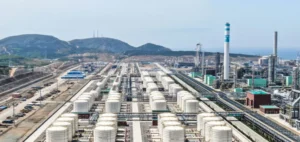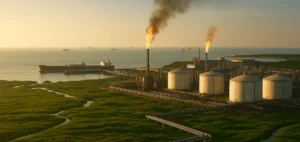The Israel-Hamas conflict, which has escalated alarmingly recently, is raising concerns about its impact on energy markets and oil flows. Over the weekend, US President Joe Biden warned Iran not to escalate this conflict into a regional war, while strengthening the US military presence in the region, a move that put energy markets on alert. In an interview with CBS, Biden said “not to” when asked if he thought the Tehran regime might make the situation worse.
However, Iranian Foreign Minister Hossein Amir-Abdollahian warned of a possible escalation of the conflict, saying that “if Israel did not stop its retaliation in Gaza, it is very likely that many other fronts would open up.”
Implications for energy flows
To date, disruption to energy markets has been confined mainly to the eastern Mediterranean since Hamas militants launched attacks from Gaza on Israel on October 7. Gas flows were the hardest hit. Israeli gas exports via the EMG offshore pipeline to Egypt have been suspended, with exports redirected via the FAJR pipeline in Jordan, following the order to shut down the Tamar platform.
An escalation of the conflict beyond Gaza could, in theory, present a more serious risk to oil flows, particularly from the Persian Gulf, where Iran holds a strategic position overlooking the Strait of Hormuz. Jim Burkhard, Vice President and Head of Research for Oil Markets, Energy and Mobility at S&P Global Commodity Insights, warned that 500,000 barrels a day of Iranian exports could be at risk if the US strengthens sanctions.
Impact on prices
Fears that the conflict could spread further to the Middle East contributed to optimism in the oil markets, fueled by a mix of voluntary OPEC+ supply cuts and heightened geopolitical risks linked to the conflict in Ukraine and sanctions against Russia. Platts Brent Dated oil was last assessed on October 15 at $92.735 per barrel, up nearly $14.50 since the start of 2023.
However, futures prices fell slightly on October 16. At 11:32 GMT, ICE December Brent futures were down 15 cents a barrel on the previous close, at $90.89 a barrel, while NYMEX November light sweet futures were up 2 cents a barrel, at $88.
Impact on Gas Markets
Geopolitical concerns also had an impact on gas markets. Platts, a division of S&P Global Commodity Insights, valued the December JKM liquefied natural gas (LNG) spot price at $18.345/MMBtu on October 16, an increase of over 40% since October 6, the day of the Hamas attacks.
Infrastructure and conflict
No major oil or gas infrastructure is located near the Gaza Strip or southern Israel, but Israel has shut down gas production from its Tamar field as a precaution. Chevron said on October 9 that it had received instructions from the Israeli Ministry of Energy to halt gas production on the Tamar platform due to the unprecedented Hamas attack.
Israel has become a major gas producer in recent years thanks to the Tamar, Leviathan and Karish fields. In May this year, the Israeli government approved a plan to build a new onshore gas pipeline to Egypt, which would allow the export of an additional 6 billion cubic meters of Israeli gas per year. The 65 km pipeline, which will run from Ramat Hovav to Nitzana on the border with Egypt, is expected to cost around 900 million shekels ($250 million). Tamar, which has been closed in the past due to conflicts in the region, produced 10.2 billion cubic meters of natural gas in 2022.
Impact on refineries and ports
Downstream, Israeli refinery operations could be impacted by an escalating conflict, which could see the facilities targeted by Hezbollah militant strikes from neighboring Lebanon. Maritime operations may also be disrupted in the conflict zone.





















